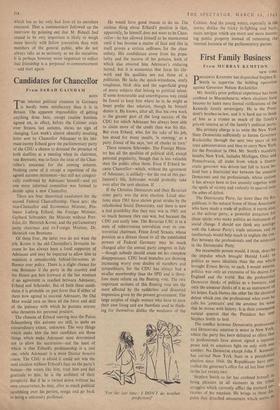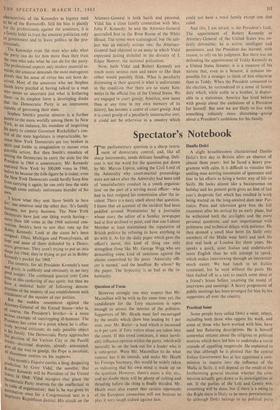First Family Business
From MURRAY KEMPTON
NEW YORK
PRESIDENT KENNEDY has dispatched Stephen E. Smith to supervise the holding operation against Governor Nelson Rockefeller.
Mr. Smith's prior political experience has been confined to Massachusetts, where elections have become by habit mere formal ratifications of the Kennedy family sovereignty. He is the Presi- dent's brother-in-law, and it is hard not to think of him as a trustee as much of the family's private interest as of the family's political party.
His primary charge is to unite the New York State Democrats sufficiently to harass Governor Rockefeller through the next two years of his state administration and then to carry New York for the President in 1964. Mr. Smith's mandate, besides New York, includes Michigan, Ohio and Pennsylvania, all states from which a Demo- cratic governor was driven last fall to leave be- hind him a fratricidal war between the amateur Democrats and the professionals, whose custom it has always been to live uneasily together with the spoils of victory and violently to quarrel over the ashes of defeat.
The Democratic Party, far more than the Re- publican, is the natural home of those Americans who have made a trade of politics; it exerts also, as the activist party, a powerful attraction for those spirits who make politics an instrument Of social change. I should not think any analogy with the Labour Party's trade unionists and its intellectuals would help much to explain the con- flict between the professionals and the amateurs in the Democratic Party.
No reasonable person would, I think, describe the impulse which brought Harold Laski to politics as more idealistic than the one which brought Ernest Bevin; to each. I would assume, politics was only an extension of his desires for England and the world. But the professional Democrat thinks of politics as a business; and only the amateur thinks of it as an instrument of his hcipes. Each blames the other for the electoral defeat which cost the professional what even he calls his 'contracts' and the amateur his sense that he moves with history. It is their consequent natural quarrel that the President has sent Stephen Smith to heal. The conflict between Democratic professional and Democratic amateur is worst in New York' where the party has been defeated so often that its professionals have almost signed a separate peace and its amateurs fight on only with one another. No Democrat except John F. Kennedy has carried New York State in a presidential election since 1944; the Republicans have eon- trolled the governor's office for all but four years in the last twenty-two.
Stephen Smith so far has confined himself t0, being pleasant to all elements in the tribal struggles which currently afflict the trusteed ter• ritories of his mandate. He brings to these dis- putes that detached amusement which seems as characteristic of the Kennedys as bigotry used to be of the Romanoffs. Still his bias is plainly for the professionals against the amateurs; it is a family habit to trust the amateur politician only in government and to leave politics to the pro- fessionals.
The Kennedys trust the man who asks what the party can do for him more than they trust the man who asks what he can do for the party. The professional expects only modest material re- wards; the amateur demands the most outrageous proofs that his sense of virtue has not been de- ceived. Most of the amateurs who see Stephen Smith leave puzzled at having talked to a man who seems so uncertain just what is bothering them—in its simplest form a developing doubt that the Democratic Party is an instrument capable of governing their state. Stephen Smith's precise mission is a further Puzzle to the more worldly among them. In New York, as an instance, his mandate of inspiriting his party to contest Governor Rockefeller's con- trol of the state legislature is impracticable, be- cause New York Democrats are too broken in Spirit and feeble in imagination to mount even guerrilla action. But then Smith's mandate of uniting the Democrats to carry the state for the President in 1964 is unnecessary; Mr. Kennedy captured New York by 300,000 votes in 1960, before he became the folk-figure he is today; even the New York Democrats could hardly keep him from carrying it again; he can only lose the state through some entirely unforeseen blunder of his own.
for know what they sent Steve Smith in here one amateur said the other day. 'It's family business, not party business. The New York bemocrats have just one thing worth having- Inore than 100 votes at the 1968 national con- vention. Smith's here to sew that vote up for bobby Kennedy. Look at the states he's been assigned: Ohio, Michigan and Pennsylvania, all huge and none of them defended by a Demo- cratic governor. They aren't trying to put us into shape for 1964; they're trying to put us in Bobby "nnedy's pocket for 1968.' The country, for all President Kennedy's ease and grace. is suddenly and obviously in no very Pod temper. The continued quarrel over Cuba ',Tilts at this cankering of our spirit; but then we have a national habit of following demon- strations of the majesty of our establishment with exhibitions of the squalor of our politics. But the sudden resentment against the Attorney-General of the United States—who is, 0f course, the President's brother—is a more serious example of outcropping ill-humour. The trtresident has come to a point where he is effec- isvehlY beyond criticism; its only possible object th family. The Democratic Party approaches .ne Position of the Vatican City in the Pacelli ;vu all there_
e doctrinal disputes, already attenuated, all way to gossip; the Pope is inviolate; This centres on his nephews.
Robert Kennedy will be President of the United ,‘"ttes in 1968. Vidal occupies that place the "sernt ocratic Party reserves for the intellectual in It table of noMinatio organisation: that is, he was given its n once for a Congressional seat in a hopelessly Republican district. His attack on the Attorney-General is both harsh and personal. Vidal has a close family connection with Mrs. John F. Kennedy; he and the Attorney-General quarrelled first in the Rose Room of the White House, The terms were scatalogical; but the sub- ject was an entirely serious one; the Attorney- General had objected to an essay in which Vidal expressed lasting disbelief in the divinity of J. Edgar Hoover, the national policeman.
Now, both Vidal and Robert Kennedy are much more serious men and easier to like than either would possibly think. What is peculiarly distressing in their quarrel is what is unfortunate in the condition that there are so many Ken- nedys in the official line of the United States. We are engaged in court gossip; America, now more than at any time in my own memory of its history, has become a centre of court gossip. And it is court gossip of a peculiarly unattractive sort; it could not be otherwise in a country which could not have a royal family except one that ruled.
And this, I am afraid, is the President's fault. The appointment of Robert Kennedy as Attorney-General of the United States was en- tirely defensible; he is active, intelligent and passionate, and the President has learned, with reason, to rely on his judgment. But there was no defending the appointment of Teddy Kennedy as a United States Senator; it is a measure of his stature that, even as a Senator, it remains im- possible for a stranger to think of him otherwise than as Teddy. When the President consented to his election, he surrendered to a sense of family duty which, while noble in a brother, is deplor- able in a statesman. America has lived before with gossip about the ambitions of a President for himself. But now we are likely to live with something infinitely more disturbing—gossip about a President's ambitions for his family.



































 Previous page
Previous page